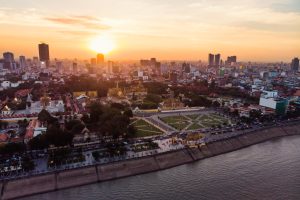The governments of Vietnam and the United States are calling for greater transparency over a $1.7-billion canal project that is being built by a Chinese state-owned firm in southern Cambodia.
The 180-kilometer-long Techo Funan Canal, which is scheduled to begin construction later this year, will connect the country’s capital Phnom Penh to the coastal province of Kep, lowing the cost of shipping goods between the capital and the country’s only deep-sea port at Sihanoukville and reducing its reliance on Vietnamese ports. China’s state-owned China Bridge and Road Corporation landed the deal to develop the canal during last year’s Belt and Road Forum in Beijing.
While the Cambodian government says that the project is intended to benefit the country’s economy by making it less dependent on its eastern neighbor — Prime Minister Hun Manet has described the project as a way of “breathing through our own nose” — the environmental and security implications of the project have drawn scrutiny, particularly next door in Vietnam.
As Sothearak Sok wrote for The Diplomat back in January, the project was likely discussed when Cambodian Prime Minister Hun Manet traveled to Vietnam late last year. During talks with Prime Minister Pham Minh Chinh, the latter expressed concerns that the project might negatively affect the ecology of the already-vulnerable Mekong River, especially the downstream water flow from Cambodia to Vietnam.
In comments given yesterday in response to questions from reporters about the security implications of the canal, Doan Khac Viet, a deputy spokesperson for Vietnam’s Ministry of Foreign Affairs, said that while Vietnam “supports the economic and social development needs of Mekong River countries,” it also underscored the “importance of enhancing cooperation to effectively and sustainably manage and utilise the Mekong River’s water resources for the sustainable development of the basin.” Viet also called on Cambodia “closely coordinate with Viet Nam and the Mekong River Commission [MRC] in sharing information and assessing the impacts of this project.”
Vietnamese sources have also expressed more explicit worries about the security implications of the canal, which would allow navy ships to travel inland from the Gulf of Thailand. Much of this concern centers on the fact that the canal is being built by a Chinese firm, and that it will spill into the ocean not far from the Ream Naval Base, where the Chinese government has sponsored extensive renovation works.
In a commentary published last month by Vietnam’s People’s Public Security Political, and quoted by Bloomberg, said that the Funan Techo Canal “is not simply a socio-economic development project but also has great military value and has a strong impact on the defense and security situation of the entire region.”
For this reason, too, the project has attracted the attention of the U.S. government, which has been alarmed about the possible Chinese presence at Ream, despite the Cambodian government’s continued denials.
In comments provided to Bloomberg earlier this week, Wesley Holzer, a public diplomacy officer at the U.S. embassy in Phnom Penh, urged the Cambodian government to “coordinate closely” with the MRC over the project, and “to participate fully in any appropriate environmental impact studies to help the MRC and member countries fully understand, assess, and prepare for any possible impacts of the project.”
She added, “The Cambodian people – along with people in neighboring countries and the broader region – would benefit from transparency on any major undertaking with potential implications for regional water management, agricultural sustainability, and security.”
Cambodian officials have rejected the concerns about both the canal and the naval base, insisting that Cambodia’s Constitution pledges it to remain neutral. In a bilingual Khmer and English post on his Facebook page dated April 9, former Prime Minister Hun Sen, who stepped down last year and handed power to his son, accused foreign observers of “fabricat[ing]” the claim that the canal “will further facilitate the Chinese navy near the Vietnamese border even when the canal is still under construction.”
He said that Cambodia and Vietnam are “good neighbors and have good cooperation in all fields” and that the canal “purely serves socio-economic benefit as it provides more waterways to the southwestern Cambodia additional to the existing transport routes along the Mekong River.” Whatever their validity, such reassurances are unlikely to succeed in where past ones have failed.

































